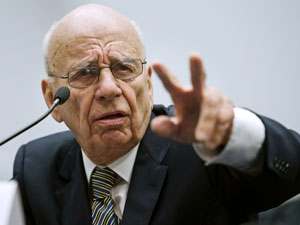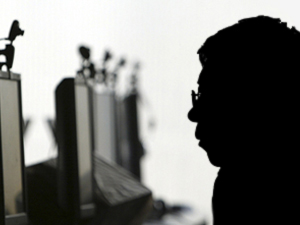
Rupert Murdoch: Journalism’s Jack the Ripper Rupert Murdoch: Journalism’s Jack the Ripper
Media observers horrified at the thought of a Koch takeover of the Tribune Company are more sanguine about Murdoch. What are they thinking?
May 8, 2013 / Column / Eric Alterman

CISPA Is ‘Dead for Now,’ Thanks to a Left-Right Coalition for Online Privacy CISPA Is ‘Dead for Now,’ Thanks to a Left-Right Coalition for Online Privacy
Industry lobbyists outspent activists 38-1, but a grassroots coalition and dissenting members of Congress appear to have rendered CISPA “dead for now.”
Apr 26, 2013 / John Nichols
This Week: For Media Democracy This Week: For Media Democracy
Some perspective on the concentration of the press in the power of a few and the dangers of media consolidation.
Apr 6, 2013 / Katrina vanden Heuvel
Will Obama Defend Media Democracy? Will Obama Defend Media Democracy?
His next appointee for FCC chair could determine whether robber barons consolidate their domination of the public discourse.
Apr 3, 2013 / John Nichols and Robert W. McChesney

The New Telecom Oligarchs The New Telecom Oligarchs
In her book Captive Audience, Susan Crawford shows how media giants exert a stranglehold over consumers and government.
Apr 3, 2013 / Feature / Michael J. Copps

How Mergermania Is Destroying Book Publishing How Mergermania Is Destroying Book Publishing
The merger of Penguin and Random House is part of a trend that has been deadly for literary authors and serious nonfiction.
Nov 28, 2012 / Books & the Arts / André Schiffrin

Rupert Murdoch and the ‘Jewish Owned Press’ Rupert Murdoch and the ‘Jewish Owned Press’
The Fox News owner resorted to an anti-Semitic canard in attacking alleged media bias against Israel.
Nov 28, 2012 / Column / Eric Alterman
Bill Moyers: For Campaign Cash, TV Gives Back Nothing Bill Moyers: For Campaign Cash, TV Gives Back Nothing
The campaign season earns local television stations enormous sums of money. What should they give back?
Aug 14, 2012 / Books & the Arts / Laura Flanders
Forgive Those Who Press Pass Against Us? Forgive Those Who Press Pass Against Us?
Reed dissects the the journalistic equivalent of mortal sins.
Aug 10, 2012 / Eric Alterman
On the Other Hand…Nothing: The Trouble with Even-handedness On the Other Hand…Nothing: The Trouble with Even-handedness
The decades-long class war being waged by corporate America and the superrich on the rest of us has been aided tremendously by the media’s tendency to treat both sides as if they are guilty of what only one side is doing. Even the best newspapers will all too often run misleadingly evenhanded headlines above stories that reveal a decidedly less balanced reality. For instance, on June 13, beneath the headline “Campaign Aid Is Now Surging Into 8 Figures,” the New York Times ran a story demonstrating that it was only Republican campaign aid that was doing so. Well down in the story, we learn that “Democrats have since sought to match Republicans’ super PAC advantage, but with little success. The Adelsons’ $35 million is more than the three leading Democratic super PACs have raised combined.” In fact, nobody at all has given the Democrats a single eight-figure contribution, but the casual reader of the paper—which is most of us—will turn the page with a false understanding of what is no doubt the key dynamic of our politics. Ditto the story on CBS.com running beneath the headline “A record amount of money spent on Wisconsin recall.” Again, the reader must wade into the story’s fifth paragraph to learn that the words “record amount” actually mean that Governor Scott Walker raised and spent more than seven times the amount of his opponent, Tom Barrett, and bought himself re-election. The failure in such stories to focus on the way money buys power in our post–Citizens United political universe allows those who seek to promote the interests of the wealthy and powerful to pretend that these corrupted election contests represent a free and fair battle of ideas. A prime specimen can be seen in a near hysterical tirade by Washington Post editorial writer Charles Lane, directed toward anyone and everyone who supported the Wisconsin recall. Following the election results, Lane demanded apologies from—I swear I’m not making this up—rock singer Conor Oberst, unnamed poster makers whose work he found offensive, Post columnist Harold Meyerson, labor leader Gerald McEntee and Nation editor Katrina vanden Heuvel for their refusal to support the election’s winner in advance. As he admits in his screed, Lane is a hater of public sector unions, whose existence he somehow finds “inherently undemocratic.” Fine, if that’s what he wants to believe. It’s not actually that surprising a view for a former editor of Marty Peretz’s New Republic (may it rest in peace). But the focus on “both sides” spending rather than on the extraordinary imbalance that lets one side drown out the other allows ideologues like Lane to pretend that one set of ideas has triumphed over another without addressing the influence of all those millions. The closest Lane came to acknowledging the role of the money that the Koch brothers and their cronies poured into Wisconsin was to sneer at those who argue it might have had some effect: “Of course Walker exploited existing state campaign-finance law to raise as much money as possible wherever he could. What the heck did his opponents expect him to do? Unilaterally disarm?” Whenever one is tempted to be generous in one’s interpretation of the origins of the false equivalence that empowers a diatribe like Lane’s, we find ourselves confronted by evidence of a degree of cynicism that somehow manages to exceed our most cynical expectations. Exhibits A, B and C in this regard can be found on Page 1 of the May 31 Politico, in which executive editor Jim VandeHei and chief White House reporter Mike Allen took up the cudgels for the Romney campaign in seeking to blame the New York Times and the Washington Post for alleged liberal bias. The argument complained of two stories on the Romneys, one of which focused on Ann Romney’s interest and investment in “dressage.” That piece, while straightforward and respectful, was attacked by Politico for its “clear implication” that “the Romneys are silly rich, move in rarefied and exotic circles, and are perhaps a tad shady.” The Politico honchos were also unhappy with a lengthy story about Mitt Romney’s high school years, in which former classmates recalled some unpleasant instances of his penchant for bullying his classmates. Its “clear implication”? ”Romney was a mean, insensitive jerk.” The authors complained, meanwhile, that these stories could be contrasted with the modest coverage of Post reporter David Maraniss’s biography of President Obama, in which new details emerged about his pot-smoking days in college and afterward. Case closed, argue the authors: the right’s constant kvetching over alleged liberal bias in the media “often ring[s] true.” A better example of a news version of apples and oranges would be hard to imagine. In fact, it’s rather alarming that two influential figures in the insider media would be willing to make such a transparently flimsy argument merely to curry favor with Republicans and the Romney campaign. One only has to point out the obvious: Obama has been president for nearly four years. He has a record upon which he can be judged. These personality-driven stories that appear on presidential candidates were all written about Barack and Michelle Obama four years ago—when, yes, his admissions not only of pot smoking but coke sniffing were widely reported. The nonsensical claim by former Bush spokesman Ari Fleischer that “the press never ran probing, sneering stories about candidate Obama, and yet the Washington Post and New York Times are on overtime covering who-cares stories about Mitt Romney” is belied by dozens—perhaps hundreds—of such stories easily available in both papers’ archives. How in the world did the rest of us become so intimately familiar with the likes of the Rev. Jeremiah Wright, Bill Ayers and Tony Rezko were it not for the intense investigation of Obama’s background and history? On the other hand…
Jun 27, 2012 / Column / Eric Alterman
